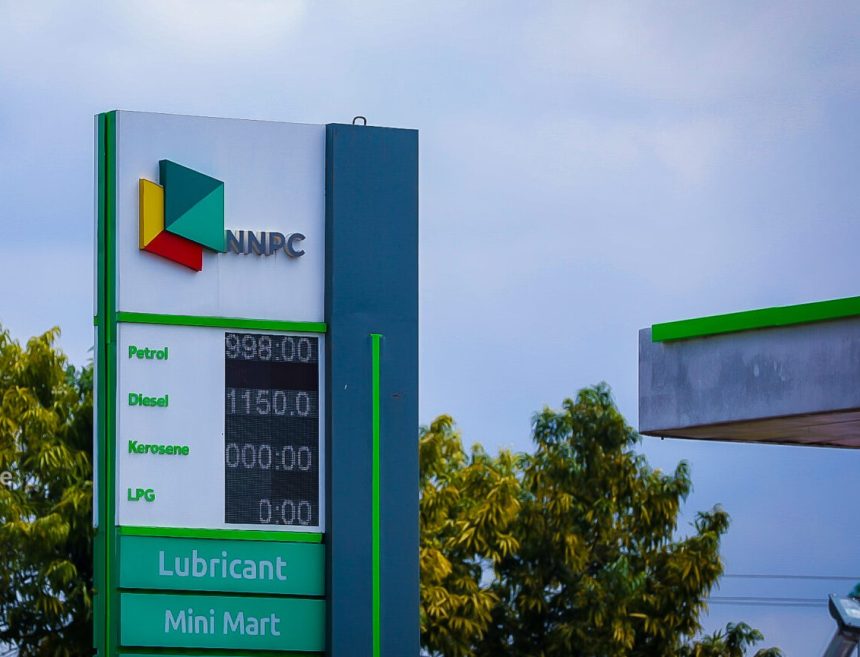The Nigerian National Petroleum Company (NNPC) Limited Wednesday increased the price of premium motor spirit (PMS), also known as petrol, across its retail outlets by 15 per cent across the country.
The development confirmed earlier report that plans were underway to fully deregulate the sector and that subsidy would no longer apply this week.
However, the complete deregulation effect, Wednesday, pushed the price of the product to N1,030 per litre, from N897 per litre in Abuja, while the price rose to N998 per litre, from N855 per litre in Lagos.
Checks indicated that the Dangote Petroleum Refinery price also increased by 8.8 per cent to N977 per litre, from N898 per litre.
The latest price increase makes it the second time the petrol price has been hiked in the past month.
This showed that the pump price of petrol has risen by more than 411 per cent since President Bola Tinubu came into office in May 2023.
Specifically, from N195 per litre before the President assumed office on May 29th, 2023, the price of the product was increased to N448 (Lagos) and N460 (Abuja) in May 31, 2024; N557 (Lagos) and N617 (Abuja) in September 2024; N610 (Lagos) and N897 (Abuja) in September 2024 before the latest increase to N998 (Lagos) and N1,030 (Abuja) in October 2024.
The latest increase, which came against expectations that the crude-for-Naira deal between the Federal Government and Dangote Refinery might lead to a reduction in the pump price beginning from October 1, 2024 has left many citizens, especially motorists, in anger.
Further checks around Abuja showed that other marketers have also adjusted their pump price upward, with major marketers selling at N1,040 per litre from N926 sold previously. Independent marketers also raised their price to N1,150 per litre.
When our correspondent visited the NNPC Retail mega station in Abuja where the price increase had been effected, shocked motorists lamented the continuing hardship in the country.
“It’s beyond belief. I have been in the queue for almost an hour and I didn’t know they had increased the price. Tinubu is not concerned about our suffering”, a taxi driver, Usman Abah, lamented.
He condemned the lack of information by NNPCL before the price increase was implemented, adding “they are taking us for granted. At the time I joined the queue, I assumed the price was still N897 per litre. I am in shock and confused.”
At a Conoil outlet, opposite the NNPC Towers in the Central Area, Abuja, consumers watched in horror as the pump price was changed in their presence from N926 per litre to N1,040 per litre.
Close by, at the TotalEnergies outlet, the station continued selling at the old price of N926 per litre.
Adetunji Oyebanji the Managing Director, 11 Plc (formerly Mobil Oil Nigeria Plc), , said: “I believe the price of PMS has finally been deregulated, and subsidy has finally been eliminated. Henceforth, the price of PMS will be determined by market dynamics. This is inevitable as the government could no longer bear the burden of the subsidy.
“A good measure the government has taken to mitigate the development is the sale of crude oil to local refineries in Naira at a fixed exchange rate. This will protect consumers from the negative impact of the fluctuations in exchange rates.
‘’The fact that the crude will be refined in local refineries will also save the cost of transporting crude to offshore refineries and transporting refined products back to Nigeria.
“Without these two factors, prices would have been higher. Another thing will be that the incentive to smuggle petrol from Nigeria to our neighbouring countries will be greatly reduced. Henceforth, prices can change at any time, depending on market dynamics.
“Customers will make informed choices about where to buy. Operators will need to improve on safety, customer service, and accurate measurement to retain customers. This is also the time for consumers to consider alternative sources of powering their vehicles like CNG.
“The era of full competition has come to Nigeria. With time, things will settle down, and people will make informed choices. The government should invest in mass transportation, especially with CNG buses.
“Greater incentives should be given in terms of duty waivers on conversion kits and other CNG equipment and vehicles.”
However, the Independent Petroleum Marketers Association of Nigeria, IPMAN, has lamented that it costs over N50 million to load a truck of petrol.
The Public Relations Officer, IPMAN, Chinedu Ukadike, said several independent marketers have shut down operations due to the high cost of capital required to run the business. Ukadike, however, pointed out that the full deregulation of petrol prices and withdrawal of NNPC Limited as the sole off-taker of petrol from Dangote Refinery will open opportunities for competition among marketers.
“We are ready to compete. We have our tank farm now in Calabar and we’re ready to compete and face the challenges that come from operating in a deregulated sector. We also have plans to acquire more tank farms in other parts of the country”, he declared.
Also, private filling stations have started adjusting their prices, with the Mobil filling station at College road, Ogba, adjusting its pump price to that of NNPC.
The price development comes weeks after the NNPC commenced petrol lifting at the Dangote Petroleum Refinery’s gantry after an extended period of price negotiations.
On September 15, the NNPC said petrol was bought from Dangote refinery at N898 per litre.
The Dangote refinery countered NNPC’s claim, describing it as “both misleading and mischievous”.
A day after, the national oil company announced estimated pump prices based on prices set by the Dangote refinery for its petroleum products, saying petrol will sell for N950 in Lagos and N999 in Abuja.






